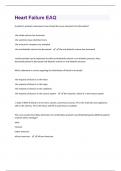Exam (elaborations)
Heart Failure EAQ Questions And Answers Rated A+ New Update Assured Satisfaction
- Course
- Institution
A patient's preload is decreased. How should the nurse interpret this information? -the stroke volume has increased -the ventricles have stretched more -the muscarinic receptors are activated -the end-diastolic volume has decreased - the end-diastolic volume has decreased -cardiac preload can ...
[Show more]



